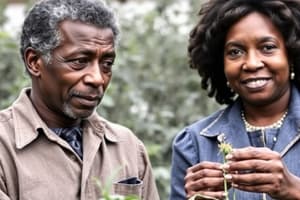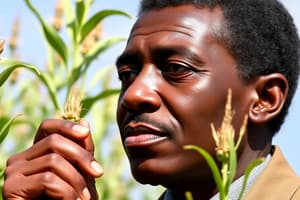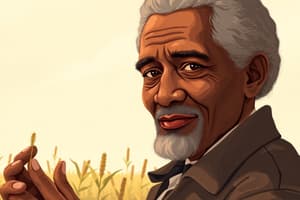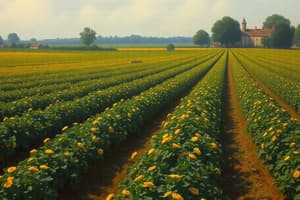Podcast
Questions and Answers
What was George Washington Carver's primary contribution to the Southern United States economy?
What was George Washington Carver's primary contribution to the Southern United States economy?
- Establishing large cotton plantations.
- Developing methods to improve soil and diversify crops. (correct)
- Promoting the exclusive cultivation of sweet potatoes.
- Introducing cotton as the main cash crop.
Which institution recognized George Washington Carver's 'outstanding achievement' with the Spingarn Medal in 1923?
Which institution recognized George Washington Carver's 'outstanding achievement' with the Spingarn Medal in 1923?
- National Association for the Advancement of Colored People (NAACP) (correct)
- Tuskegee Institute
- US House of Representatives
- Iowa State Agricultural College
Prior to his work at Tuskegee Institute, what significant educational milestone did George Washington Carver achieve?
Prior to his work at Tuskegee Institute, what significant educational milestone did George Washington Carver achieve?
- He became the first African American professor at Harvard University.
- He founded the Tuskegee Institute.
- He was the first African American to earn a degree at Iowa State Agricultural College. (correct)
- He established an agricultural research laboratory in Missouri.
What was the primary agricultural issue in the Southern US that George Washington Carver sought to address?
What was the primary agricultural issue in the Southern US that George Washington Carver sought to address?
Approximately how many marketable products did George Washington Carver develop from peanuts?
Approximately how many marketable products did George Washington Carver develop from peanuts?
In what year did George Washington Carver address the US House of Representatives, receiving a standing ovation?
In what year did George Washington Carver address the US House of Representatives, receiving a standing ovation?
What was George Washington Carver's role at the Tuskegee Institute for 47 years?
What was George Washington Carver's role at the Tuskegee Institute for 47 years?
Which of the following crops did George Washington Carver NOT specifically advocate for farmers to grow to restore soil fertility?
Which of the following crops did George Washington Carver NOT specifically advocate for farmers to grow to restore soil fertility?
George Washington Carver's quote, 'Education is the key to unlock the golden door of freedom,' reflects his belief in the power of education, particularly in which year?
George Washington Carver's quote, 'Education is the key to unlock the golden door of freedom,' reflects his belief in the power of education, particularly in which year?
Besides improving soil health, what broader impact did George Washington Carver's product research have on US agriculture?
Besides improving soil health, what broader impact did George Washington Carver's product research have on US agriculture?
Flashcards
George Washington Carver
George Washington Carver
An African American agricultural scientist who improved Southern agriculture.
Agricultural Education
Agricultural Education
The study and practice of agriculture, including soil and crop management.
Nitrogen-rich Crops
Nitrogen-rich Crops
Plants like peanuts and sweet potatoes that restore soil nutrients.
Tuskegee Institute
Tuskegee Institute
Signup and view all the flashcards
Products Developed
Products Developed
Signup and view all the flashcards
Spingarn Medal
Spingarn Medal
Signup and view all the flashcards
Cotton's Impact
Cotton's Impact
Signup and view all the flashcards
Sustainable Farming
Sustainable Farming
Signup and view all the flashcards
Speaking to Congress
Speaking to Congress
Signup and view all the flashcards
Quote on Education
Quote on Education
Signup and view all the flashcards
Study Notes
George Washington Carver
- African American agricultural scientist and experimenter
- Restored the Southern US economy using innovative methods
- Improved soil, developed commercially viable crops
- Focused on crops other than cotton (e.g., peanuts, sweet potatoes, soybeans)
- Used innovative scientific techniques to improve crop yields
- Developed over 400 products from crops like peanuts and sweet potatoes
- Promoted sustainable farming methods
- Key contributor to the US agricultural industry
- Born into slavery in Missouri (1864)
- Received a master's degree in agriculture (1896)
- Became director of agriculture at Tuskegee Institute (1896)
- Worked at Tuskegee Institute for 47 years
- Taught ex-slaves farming methods
- Demonstrated that "Education is the key to unlock the golden door of freedom"
Carver's Contributions
- Developed innovative methods for soil improvement
- Created new crops and products: e.g., peanut products, oils and dyes from peanuts, and 118 products from sweet potatoes
- Developed 287 products from peanuts from 1900 to 1920
- Improved the yields, and boosted financial yields of farming
- Improved farming techniques/practices for southern farms
- Increased agricultural productivity and self-sufficiency in the South
Carver's Life
- Born a slave in Missouri (1864)
- Pursues education following the abolition of slavery (1865)
- Earned a Master's degree in agriculture in 1896
- Became the director of agriculture at Tuskegee Institute
- Successfully improved Southern Agriculture
Impact of Carver's Work
- Improved soil health in the South after over-cultivation of cotton
- Diversified crops to prevent nutrient depletion
- Increased financial yield through the production of new products
- Boosted the Southern agricultural economy
- Made the South a major contributor to the US agricultural industry
Studying That Suits You
Use AI to generate personalized quizzes and flashcards to suit your learning preferences.





